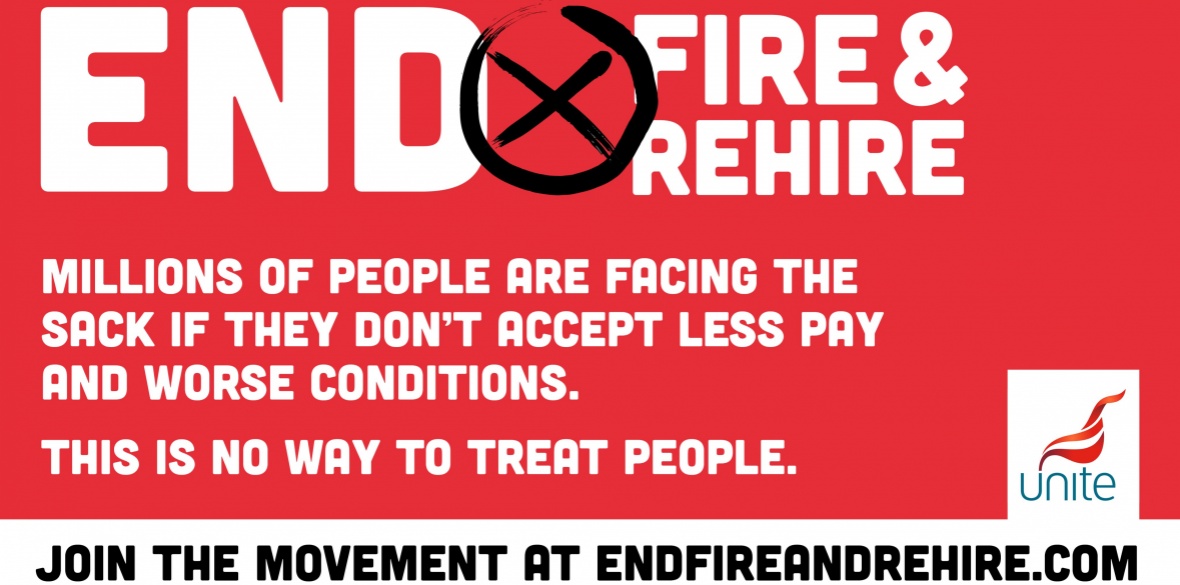UNITE’S launch of a national campaign against fire and rehire, with co-ordinated actions and strikes taking place from London to Fife today, sets a benchmark.
Activists and union reps across Britain should discuss what can be done, via trades councils, regional TUCs, local Labour and socialist parties and campaign groups such as the People’s Assembly, to publicise and oppose the deployment of these bullying tactics.
With the TUC calculating that one in 10 workers has been forced to reapply for their job on worse pay and conditions or be sacked since the pandemic struck, what Unite leader Len McCluskey calls “a disease ripping through our workplaces” is developing into a national crisis for working people.
Fire and rehire is part of an even bigger picture – one in which the economic crisis caused by the Tories’ criminal mismanagement of Covid-19 is being used to attack wages and rights at work. It is no accident that Britain leads Europe both in the number of Covid-19 deaths and the extent of the virus’s economic damage.
Nearly a quarter of workers have seen their pay or conditions downgraded over the past year. Millions have lost their jobs – and the rising tide of unemployment is what gives cynical employers the confidence to intimidate workers into accepting lower pay and a host of other attacks.
Though companies will always plead poverty, arguing that falling revenues force them to act, the Observer newspaper’s recent investigation into fire and rehire found that most firms abusing the practice were turning a profit and that more than half were claiming public money.
In reality, this race to the bottom did not begin with Covid. The most notorious face of fire and rehire – Centrica chief executive Chris O’Shea, whose mass dismissal of British Gas engineers this month went ahead despite hard-fought resistance including 43 days of strike action called by their union GMB – defended the decision to cut extra pay for staff working weekends or bank holidays on the grounds that this was already the norm for many service industry workers.
In doing so he unwittingly underlined the labour movement motto, “an injury to one is an injury to all.” The removal of time-and-a-half-style arrangements for working unsocial hours has proceeded over decades, just as wages overall have lagged behind economic growth in Britain, constituting an ever smaller share of GDP as corporate profits swallow up more and more of the national output.
With fewer workers entitled to such payments, the easier it is for employers to take them from those still enjoying them. And besides being a direct raid on the pockets of the workers affected, removing the disincentive to make staff work unsocial hours normalises weekend and bank holiday work, contributing to a wider assault on our right to leisure.
Apart from the bosses, everyone loses out. This vicious cycle applies everywhere we look: in the normalisation of mass unemployment, the use of bogus self-employment and zero-hours contracts to deprive workers of sick and holiday pay, and the use of outsourcing to drive down pay and conditions in public services. All of these have helped create an insecure workforce policed by poverty.
The catastrophic effect on our country’s ability to cope with emergencies has now been exposed. The lack of sick pay and job security are acknowledged factors in the failure to isolate and contain coronavirus outbreaks.
Yet the fire-and-rehire bombardment will exacerbate both, and leave our country even less able to withstand future crises.
That is why the fightback must be both industrial and political, drawing in communities and raising hell at Westminster to force a ban on fire and rehire (as already exists in Spain and Ireland) as a step towards a labour movement offensive in the opposite direction – one that asserts our right to higher pay, secure jobs and a better work-life balance.











